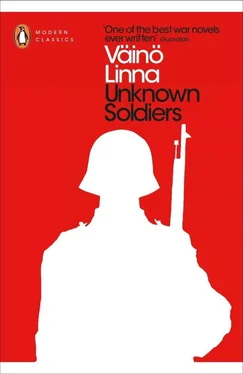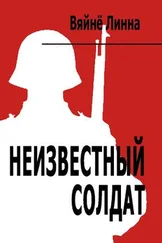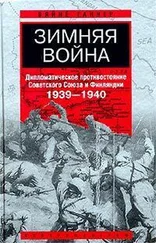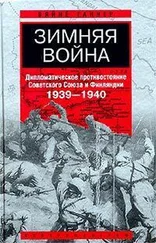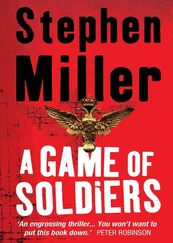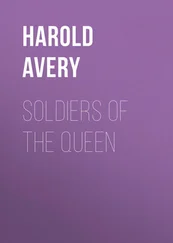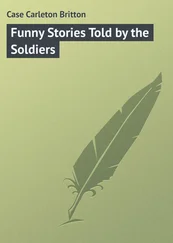Вяйнё Линна - Unknown Soldiers
Здесь есть возможность читать онлайн «Вяйнё Линна - Unknown Soldiers» весь текст электронной книги совершенно бесплатно (целиком полную версию без сокращений). В некоторых случаях можно слушать аудио, скачать через торрент в формате fb2 и присутствует краткое содержание. Город: London, Год выпуска: 2015, ISBN: 2015, Издательство: Penguin Books, Жанр: Классическая проза, Историческая проза, prose_military, на английском языке. Описание произведения, (предисловие) а так же отзывы посетителей доступны на портале библиотеки ЛибКат.
- Название:Unknown Soldiers
- Автор:
- Издательство:Penguin Books
- Жанр:
- Год:2015
- Город:London
- ISBN:978-0-141-97705-8
- Рейтинг книги:5 / 5. Голосов: 1
-
Избранное:Добавить в избранное
- Отзывы:
-
Ваша оценка:
- 100
- 1
- 2
- 3
- 4
- 5
Unknown Soldiers: краткое содержание, описание и аннотация
Предлагаем к чтению аннотацию, описание, краткое содержание или предисловие (зависит от того, что написал сам автор книги «Unknown Soldiers»). Если вы не нашли необходимую информацию о книге — напишите в комментариях, мы постараемся отыскать её.
‘A rediscovered classic… profound and enriching… Unknown Soldiers still has the power to shock’ Herald
‘One of the best war novels ever written’ Guardian About the Author
Unknown Soldiers — читать онлайн бесплатно полную книгу (весь текст) целиком
Ниже представлен текст книги, разбитый по страницам. Система сохранения места последней прочитанной страницы, позволяет с удобством читать онлайн бесплатно книгу «Unknown Soldiers», без необходимости каждый раз заново искать на чём Вы остановились. Поставьте закладку, и сможете в любой момент перейти на страницу, на которой закончили чтение.
Интервал:
Закладка:
Ensign Jalovaara sat far off in the forest. He had made his way there gradually, as if he had no idea where he was going. When he saw that no one was around, he sat on a mound of grass and let his head drop between his hands. He sat motionless for a long time, staring at the ground. From far down the road, the clatter of the cart receded further and further into the distance.
His eyes were damp. Jalovaara clenched his jaw for a long time, trying to steel himself against what was coming. But eventually his shoulders began to quiver, and his whole body shook with the bitter, violent convulsions of a man brought to tears. Between sobs and clenched teeth, he repeated over and over, ‘We heard… they let us know… that Finland’s dead… her tombs already deep beneath the snow… snow…’
The autumn sun had climbed to midday, warming the ground and the men sprawled out over it. Clusters of lingonberries glistened in their low-lying bushes. The cart rattled faintly off into the distance and silence fell, swallowing everything up into the stillness of the dry pine forest. The tired men slept. The sun smiled down on them. It wasn’t angry – no, not by any means. Maybe it even felt some sort of sympathy for them.
Rather dear, those boys.
Note on the Translation
‘Some Secretary spoutin’ off,’ Mielonen calls out through the camp, unofficially signaling to the men that the Finnish authorities are conceding defeat. His tone in these final pages of the book is as flippant as it was at the start, when he made his rounds with a similar announcement portending the declaration of war. So perhaps it is not surprising to learn that the gentleman ‘spoutin’ off’, whose historic words are quoted verbatim, was not ‘some Secretary’, but Risto Ryti, President of Finland. [1] See Jyrki Nummi, Jalon kansan parhaat voimat [ The Finest Forces in the Noble Nation ] (Helsinki: Werner Söderström Osakeyhtiö [WSOY], 1993), pp. 48–9 .
Mielonen’s misattribution could be a joke – or perhaps he just didn’t know who was going to speak before the voice came over the radio. Just after the decisive words are delivered, however, the narrator affirms Mielonen’s account with a gravity that would be difficult to construe as jocular. ‘It was the Secretary,’ we read, in the final installment of a parallel structure aligning the Secretary with Rahikainen and Sihvonen (p. 465 It was the Secretary. Honkajoki fished some bread out of his pack and came across a couple of pieces of wood carved into bizarre shapes. He tossed them to Vanhala and said, ‘Into the fire with them, Priha! I’ve lost my inspiration.’ Priha was on his knees beside the campfire. He blew into it and got a light flurry of ash in the eyes. He rubbed them with his fists. Then he looked at Honkajoki. Dirt and grime covered his face, which had lost much of its previous roundness. But the red, puffy corners of his eyes still crinkled with his smile as he shook with laughter and said, ‘If only we still had your bow… heeheehee!’ ‘Alas. If only that damn Bushki, excuse me, that Soviet in the shrubbery, hadn’t made it into the position from the side… making me suffer the most distressing loss of this war.’ Priha turned toward the campfire again and said, blowing on the flames, ‘The Union of Soviet Socialist Republics won, but racing to the line for a strong second place came feisty little Finland.’ The ash swirled up. Heeheeheeheehee. Soon, even the last of them had dropped off to sleep. A lone horse-cart made its way along the road, its rattle echoing through the forest. Tent tarps covered its load. A stiff hand clenched into a fist dangled down beneath one of the edges. The last of the casualties were heading home. Ensign Jalovaara sat far off in the forest. He had made his way there gradually, as if he had no idea where he was going. When he saw that no one was around, he sat on a mound of grass and let his head drop between his hands. He sat motionless for a long time, staring at the ground. From far down the road, the clatter of the cart receded further and further into the distance. His eyes were damp. Jalovaara clenched his jaw for a long time, trying to steel himself against what was coming. But eventually his shoulders began to quiver, and his whole body shook with the bitter, violent convulsions of a man brought to tears. Between sobs and clenched teeth, he repeated over and over, ‘We heard… they let us know… that Finland’s dead… her tombs already deep beneath the snow… snow…’ The autumn sun had climbed to midday, warming the ground and the men sprawled out over it. Clusters of lingonberries glistened in their low-lying bushes. The cart rattled faintly off into the distance and silence fell, swallowing everything up into the stillness of the dry pine forest. The tired men slept. The sun smiled down on them. It wasn’t angry – no, not by any means. Maybe it even felt some sort of sympathy for them. Rather dear, those boys.
).
I like to think of this closing gesture on Väinö Linna’s part as a cautionary one: a reminder that the story you have just read is not history, but fiction. I’m not sure how else to make sense of the blatant and irresolvable incompatibility between narratorial assertion and historical fact. It certainly seems implausible that the author simply forgot that the words he was quoting verbatim were spoken by the president of his country. More convincing, I think, is the reading by which the deliberate violation of history seeks to clarify the distinction between testimonial truth and the kind of truth the novel pursues. The historical elements that have appeared here, the author seems to imply – the school songs, the propaganda, the President’s speech – are no more real than the imagined exclamations of Sihvonen and Rahikainen. Reality and the use I have made of it belong to separate worlds.
The distinction between these two worlds was a matter of crucial importance for Väinö Linna. It is for this reason, above all, that I have refrained from annotating my translation of his text with historical references, maps, timelines or other textual supports. To gloss unfamiliar items with information drawn from history seemed to me to suggest an unwarranted equivalence between Linna’s fictional world and the one we live in. Some readers will no doubt protest that some such information is necessary to a full understanding of the book. I would argue that, for the most part, this is not the case. One might turn to any number of examples, for instance: ‘Around Christmas time, the German battleship Scharnhorst sank in the Arctic Sea’ (p. 361). Should contemporary English readers be alerted to the fact that the Scharnhorst was a real German battleship that sank in the Arctic on 26 December 1943? Finns reading the novel in 1954 would have known, one could argue, and the information would have enabled them to recognize the reference as an ominous chronological signpost. But then, one might also note Linna’s introductory appositive, ‘the German battleship’. Had the author been confident that all his readers knew of the event, such an appositive would have been unintuitive. Surely ‘the Scharnhorst ’ alone would have been more natural. Whatever its intention, the gesture bears two immediate consequences: it ensures the inclusion of readers situated slightly beyond the novel’s immediate frame of reference, and it creates a closed world whose logic relies on nothing outside of itself.
Given Linna’s own tendency to make explicit whatever tacit information he deemed necessary to understanding his text, I decided that this would be the most appropriate way of incorporating such information into the translation as well. So, on the rare occasions in which implicit information available to the Finnish reader needed to be explained to the English one, I have incorporated it into the translation following Linna’s own style. When the brawny Hietanen starts shouting out instructions ‘in his amusingly staccato Turku accent’, for example, the ‘amusing’ aspect of the dialect as well as its place of origin are implicit in the Finnish, explicit in the English (p. 7). I thought it important to retain the foreign, or semi-foreign, words Linna uses – undefined – throughout the Finnish text, which often meant inserting appositives for the English reader: ‘ tshasovna , one of those Karelian Orthodox chapels’; ‘kolkhoz… collective farm,’ etc. (pp. 311, 129). The appositive ‘the women’s auxiliary’ beside the name ‘Lotta Svärd’ is also my addition, as is ‘the Friday Fishing Club’ beside ‘Rajamäki Regiment’ (pp. 21, 135). I chose to double these last two references rather than replace them with English equivalents because each presents a literary reference I wanted to retain. The women’s auxiliary ‘Lotta Svärd’ takes its name from a poem by the Swedish-speaking Finn Johan Ludvig Runeberg ( Tales of Ensign Stål , 1860), and the ‘Rajamäki Regiment’ refers to a rather unruly crew in the first major novel written in Finnish, Aleksis Kivi’s Seven Brothers (1870). I privileged the sense of each reference in the appositives, as that was what comprehensibility in the English text required, but I left in the Swedish and Finnish names as well, so that the literary reader would have the means to recognize them.
Читать дальшеИнтервал:
Закладка:
Похожие книги на «Unknown Soldiers»
Представляем Вашему вниманию похожие книги на «Unknown Soldiers» списком для выбора. Мы отобрали схожую по названию и смыслу литературу в надежде предоставить читателям больше вариантов отыскать новые, интересные, ещё непрочитанные произведения.
Обсуждение, отзывы о книге «Unknown Soldiers» и просто собственные мнения читателей. Оставьте ваши комментарии, напишите, что Вы думаете о произведении, его смысле или главных героях. Укажите что конкретно понравилось, а что нет, и почему Вы так считаете.
